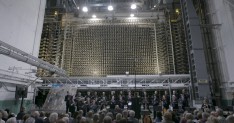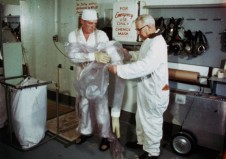Richland

Richland, photo by Helki Frantzen
Los Angeles Filmforum presents
Richland, by Irene Lusztig
Sunday July 28, 2024, 7:30pm
At 2220 Arts + Archives, 2220 Beverly Blvd., Los Angeles CA 90057
In person: Filmmaker Irene Lustzig
Tickets: $15 general, $10 students/seniors, free for Filmforum members
At https://link.dice.fm/v989494eddac
"with curiosity and care, Richland peers into the heart of a small town, acknowledges the joys, and brings the pain and loss and broken promises into the light."
- The Hollywood Reporter
“a thought-provoking and important documentary that is unafraid to lay bare how people embrace destruction if there is a place for them inside it." - The Wrap
"a gently probing portrait of a diverse community that is as American as, well, nuclear bombs."
- Hammer to Nail
Filmforum is delighted to welcome back Irene Lustzig with her latest feature, Richland. Built by the US government to house the Hanford nuclear site workers who manufactured weapons-grade plutonium for the Manhattan Project, Richland, Washington is proud of its heritage as a nuclear company town and proud of the atomic bomb it helped create. RICHLAND offers a prismatic, placemaking portrait of a community staking its identity and future on its nuclear origin story, presenting a timely examination of the habits of thought that normalize the extraordinary violence of the past. Moving between archival past and observational present, and across encounters with nuclear workers, community members, archeologists, local tribes, and a Japanese granddaughter of atomic bomb survivors, the film blooms into an expansive and lyrical meditation on home, safety, whiteness, land, and deep time.
Irene Lusztig, Director/Producer/Editor is a feminist filmmaker, archival researcher, educator, and amateur seamstress. She works in a space of delicate mediation between people, their pasts, and the present-tense spaces and landscapes where unresolved histories bloom and erupt. Often beginning with rigorous research in archives, her work brings historical materials into conversation with the present, inviting viewers to contemplate questions of politics, ideology, and the complex ways that personal, collective, and national memory are entangled. Born in England and raised in Boston, Irene is a first generation American whose parents fled Ceaucescu’s Romania as political asylum-seekers. Her work, including three previous feature length films, has been screened around the world, including at the Berlinale, MoMA, Film Society of Lincoln Center, Museum of Fine Arts Boston, Anthology Film Archives, Pacific Film Archive, Flaherty NYC, IDFA Amsterdam, Hot Docs, AFI Docs, BFI London Film Festival, Melbourne Film Festival, DocLisboa, and RIDM Montréal. She has been awarded fellowships from the Guggenheim Foundation (2021), the Radcliffe Institute for Advanced Study, the Fulbright, two MacDowell fellowships, the Flaherty Film Seminar, and the Rydell Visual Arts Fellowship. She teaches filmmaking at UC Santa Cruz where she is Professor of Film and Digital Media.

Richland, photo from US Department of Energy Hanford Collection
Richland
2023, digital, color, sound, 93 minutes
Irene Lusztig, Director/Prducer/Editor
Sara Archambault, Producer
Helki Frantzen, Cinematographer
Maile Coast Colbert, Sound Design and Composition
“S&F: How did you think about presenting the community as it currently is in conversation with the archive?
IL: I can say what I was really not interested in was experts, or people presenting a policy position. A lot of the nuclear films that I've seen tend to feature nuclear experts, and often they're pro or anti-nuclear films. I was not at all interested in that and had lots of opportunities to film that kind of stuff. I was really interested in feelings, and what I was calling nuclear feelings — ways to build intimacy with people that could get to these feelings about being haunted, or working through something in the past, or how people live with a history that's difficult. That's not the space that's most on the surface in Richland. I think Richland presents as a lot of scientists and engineers who want to tell you about science and technology.
It took a while to figure out how to get to those places, but that was always what my interest was, thinking about the emotional space of nuclear feelings and what it means for this community to live with a history that's troubling in a lot of ways, but also one that they continue to live with every day as a kind of ongoing condition. And I was interested in thinking about public spaces where history is being addressed or negotiated; that could be the local history museum that's in the film, that's this very sanitized presentation of atomic bomb production, where you never see any of the damage in Japan. It's just this story of: technology triumphs. There is also the parade that happened for the 75th anniversary of the Hanford Site, and these commemoration ceremonies that happened two years later. The one run by the National Park Service was actually the first-ever public commemoration in that community for the Nagasaki bomb. I was looking for these spaces where I felt like people were encountering some kind of narrative about history in a really active way.
But also, there's a lot of landscape in the film. I really thought about that land as a kind of archive. That land is really special; it's very beautiful, but it's also kind of untouched by industry because of the time period when it was seized by the government. A lot of that land was never cultivated and never really touched or altered. People talk about deep time and geological time all the time out there. Those are some of the kinds of things I wanted to put in conversation with each other.
S&F: Could say a little bit more about what you were reacting to with the kind of scientific "experts" documentaries sometimes include?
IL: I'm just not interested in films that are about presenting information. There's a whole chunk of a documentary that's quite invested in verbal information that's being communicated where you learn about something. When I'm making film work, I'm always trying to think about what can film do that a book can't? I mean, there are wonderful books that have a great treatment of that history. But I feel like there are lots of people who've done that work of really getting into the science, and I think that's a great thing to do in a written form. I think film can do other things that are about presence and affect. Those are the things that I'm interested in.
